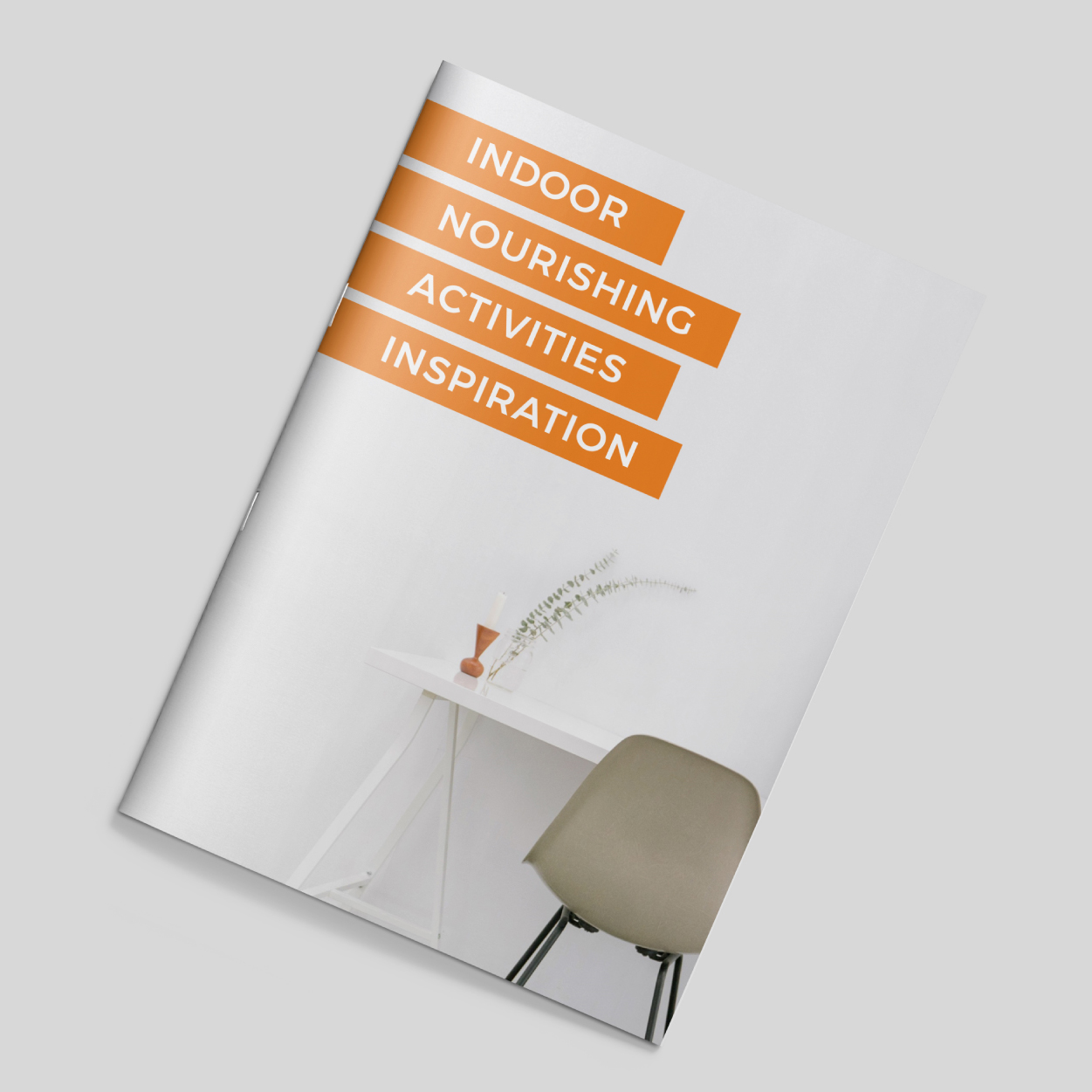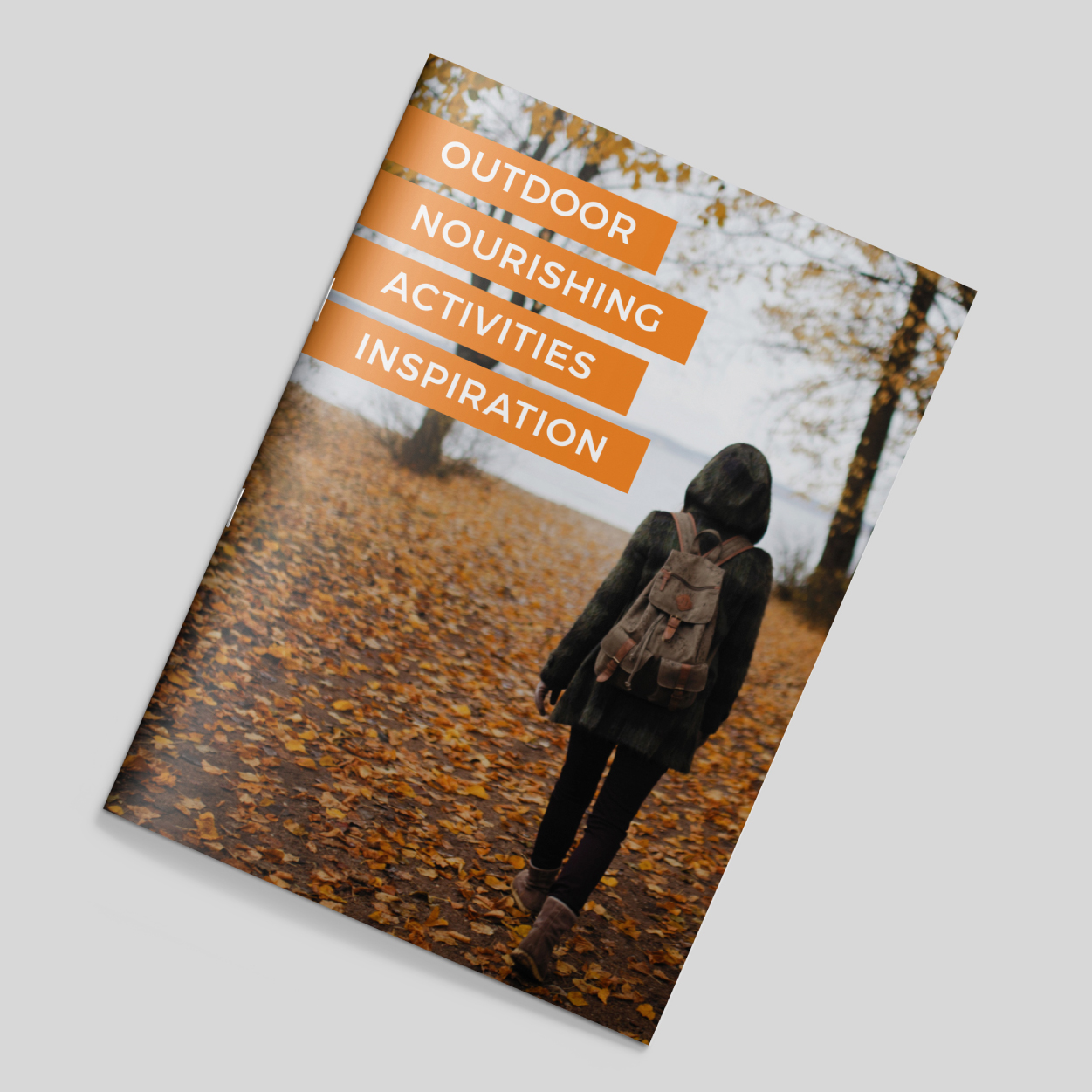Any activity you do that nurtures your mental or physical wellbeing can be thought of as “self-care”.
Not sure where to start when it comes to self-care?
Here’s a list of 40 ideas along with plenty of practical tools:
1. Movement. Engaging in regular physical activities like walking, running, yoga, or dancing can improve your fitness and release endorphins, our “feel-good” chemicals.
2. Meditation and mindfulness. Taking time to practice meditation or mindfulness to calm the mind, reduce stress, and increase self-awareness.
3. Eating well. Nourish your body with nutritious and balanced meals to support your overall wellbeing.
4. Mindful eating. Take the time to savor your meals, appreciating the taste, texture, and aroma of the food. Avoid distractions while eating.
5. Ecotherapy. Connecting with nature by going for walks in the park, hiking, or spending time at the beach to relax and recharge. Here’s a free Ecotherapy Workbook.
6. Quality sleep. Ensuring sufficient and restful sleep to rejuvenate your body and mind.
7. Hobbies and interests. Carving out time for activities that bring joy and fulfillment, such as painting, playing an instrument, or gardening.
8. Practicing gratitude. Cultivating a sense of gratitude by acknowledging and appreciating the positive aspects of life. Here’s a free printable gratitude log and art print.
9. Schedule regular health checkups. Make it a priority to schedule and attend routine health checkups with your primary care physician or healthcare provider.
10. Dental checkups and cleanings. Regularly visit the dentist for checkups and cleanings to maintain good oral health.
11. Medication adherence. This can now be managed easily given the rise in online pharmacies.
12. Socializing. Spending time with friends, family, or participating in social activities to strengthen social connections is vital for mental wellbeing.
13. Setting boundaries. Learning to say "no" when needed and setting limits to avoid overcommitting oneself. Here are some Assertiveness Worksheets.
14. Digital detox. Taking a break from screens and digital devices to reduce mental clutter and unwind. This can help with weaning you off the dopamine hits you come to crave through social media and other online interactions. Check out this dopamine detox guide to learn more.
15. Journaling. Writing down thoughts and emotions in a journal (here’s a free one) to process feelings and gain insights.
16. Listening to music or podcasts. Enjoying music or listening to inspiring podcasts to boost dopamine, uplift mood and enhance creativity.
17. Self-help tools. Self-guided programs are a great complement and/or alternative to therapy, teaching you coping skills for a calmer mind and body.
18. Volunteering. Contributing time and effort to a cause that holds personal meaning, fostering a sense of fulfillment and purpose.
19. Setting goals. Establishing realistic and achievable goals to foster personal growth and motivation.
20. Counseling or therapy. Seeking professional support to work through challenges and improve mental wellbeing.
21. Taking breaks. Allowing oneself to take short breaks throughout the day to prevent burnout and maintain focus.
22. Laughter. Watching comedies, spending time with funny friends, or engaging in laughter yoga for a mood boost.
23. Affirmations. Use positive affirmations to boost self-confidence and promote a positive mindset. Here are some free mobile wallpapers featuring some.
24. Breathing exercises. Learn breathing exercises to reduce anxiety and increase relaxation.
25. Learning. Why not dive deeper into enriching your personal growth by taking the opportunity to level up your French, Spanish or German?
26. Solo retreat. Take some time off to go on a solo retreat or staycation, allowing yourself to recharge and reflect in a peaceful environment.
27. Decluttering. Organize and declutter your living space to create a more serene and calming atmosphere.
28. Self-compassion. Practice self-compassion by being kind and understanding toward yourself, especially during challenging times.
29. Stay hydrated. Drink an adequate amount of water daily to support overall health and wellbeing. Use a water tracker app or widget to encourage yourself to drink more water.
30. Aromatherapy. Use essential oils or scented candles to create a soothing ambiance and promote relaxation.
31. Play and creativity. Engage in creative activities like drawing or writing to tap into your inner child and express yourself. If you're interested in drawing, why not check out online drawing tutorials? It's a fun way to hone your artistic skills while focusing on a specific subject.
32. Digital wellness. Use apps that track screen time and promote digital wellbeing, helping you balance your tech usage.
33. Random acts of kindness. Perform random acts of kindness for others, which can bring a sense of fulfillment and happiness.
34. Dancing. Put on your favourite music and dance like nobody's watching! Try a dance workout on YouTube.
35. Outdoor picnic. Pack a healthy and delicious picnic, and head to a nearby park or nature spot to enjoy some fresh air and sunshine.
36. Mindful colouring. Engage in coloring books or doodling to unleash your creativity and promote relaxation. Here’s a free mindful colouring booklet.
37. Plant care. Take care of indoor or outdoor plants, nurturing and tending to them. Gardening can be therapeutic and fulfilling.
38. Pamper yourself. Treat yourself to occasional pampering activities, such as a massage, spa day, or a relaxing bath.
39. Yoga or stretching. Practice yoga or gentle stretching exercises to increase flexibility, reduce muscle tension, and promote mindfulness.
40. Massage. For instance, you might opt for a deep tissue, relaxation, or remedial massage depending on your personal needs.
Adequate self-care helps prevent burnout by maintaining a sustainable balance between work, personal life, and relaxation.
So, give yourself time to perform the self-care above activities that appeal to you. You might even want to proactively schedule two nourishing activities a week. In doing so, you treat self-care as you would any other commitment, giving it the same level of importance.
By creating a routine and using technology for reminders, you can establish a consistent practice while also allowing flexibility to accommodate life’s unpredictability.
Want more inspiration? Be sure to check out this article and download our Self-Care Activities Inspiration Checklists from our Free Tools Library.



